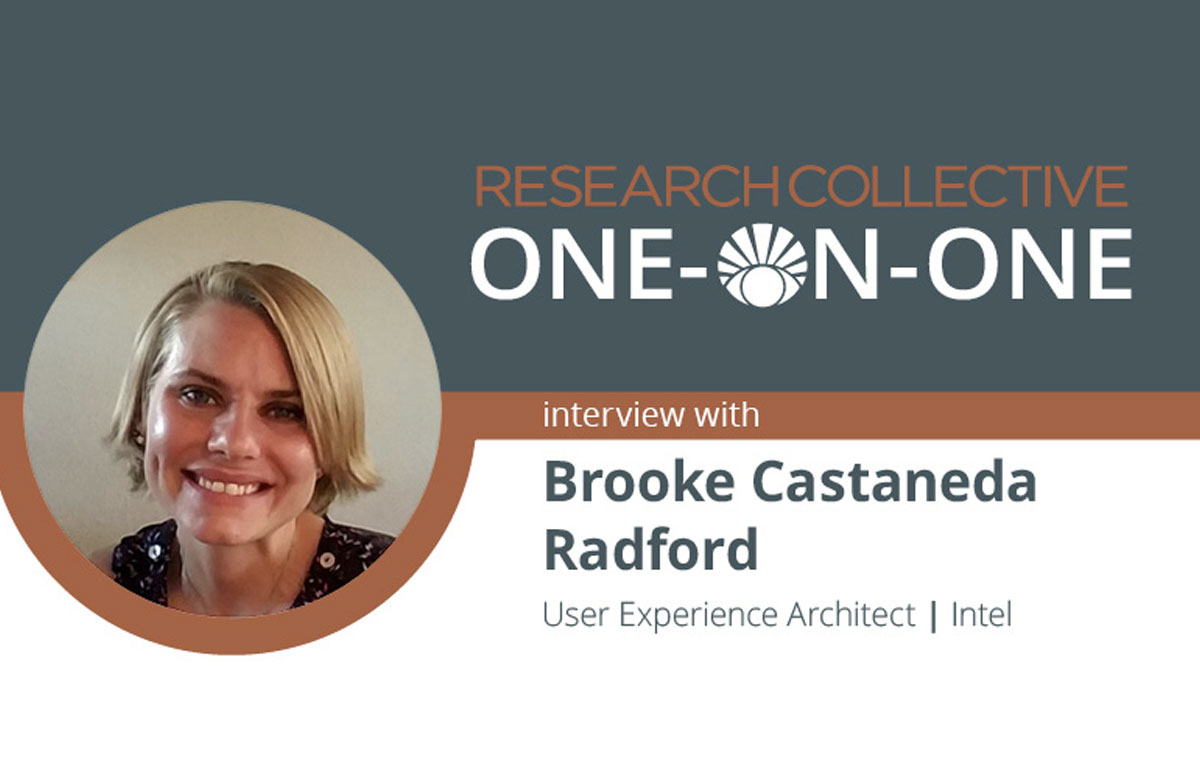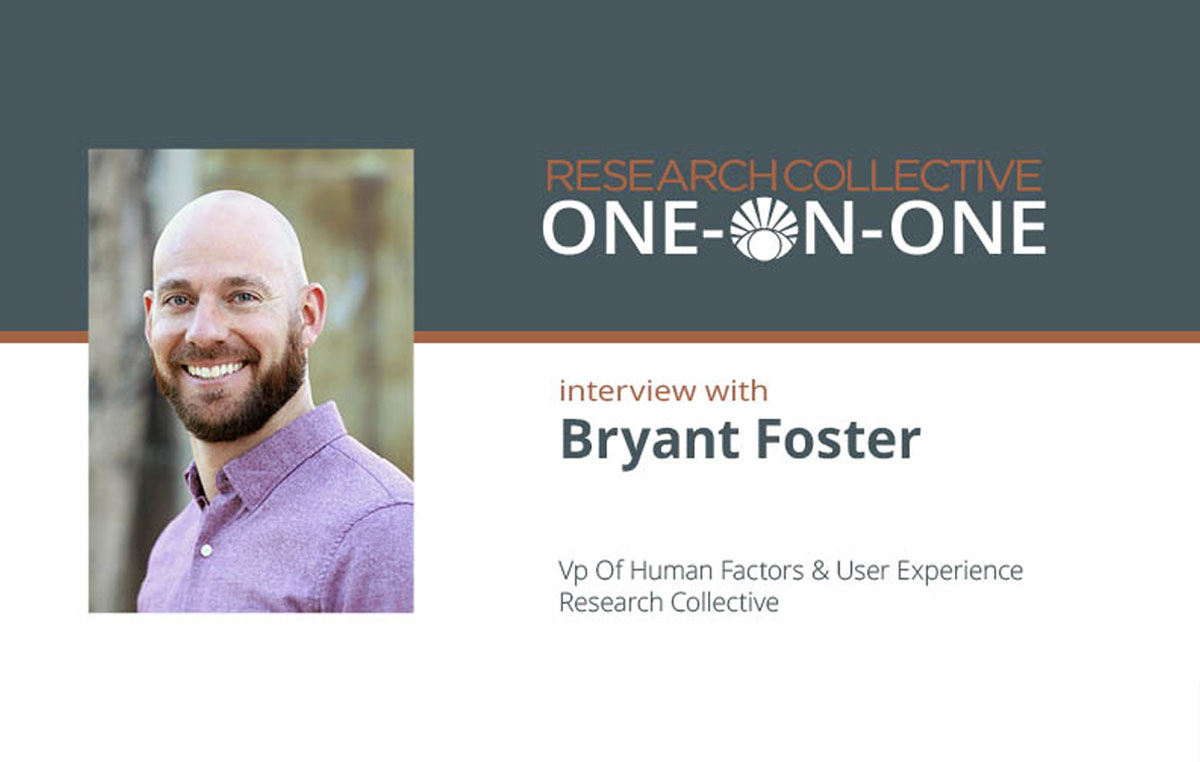Introduction
We are thrilled to have Brooke Castaneda Radford as our April 2019 one-on-one interview guest! It is a tremendous honor to have her as part of this series!
Brooke is a User Experience Architect at Intel and has over 15 years of experience in the field. During her interview, Brooke provides her thoughts on a variety of topics, including the ethics of the human factors industry, her involvement in mentor/mentee relationships, and more!
Brooke, thank you so much for joining us this month!
Research Collective: How did you get your start in human factors? What drew you to the field?
Brooke: Like many in the field, I found human factors seemingly by accident, having only heard brief mention of it in my college undergraduate courses. Soon after earning my bachelors, I did some major soul searching and began exploring graduate levels programs in human factors.
I discovered the human systems engineering program at the ASU Polytechnic Campus (called applied psychology at the time) and was instantly hooked. For me, human factors is the perfect mix of science and art; the ideal blending of exciting technological advancements with the realities of our humanness.
Research Collective: What do you love about human factors research, user experience design, and user experience architecture?
Brooke: I love that there is always something new to learn. There is always a new technology to spin up on, a budding project to tackle, or a new concept to dream about. Human factors research, user experience design, and user experience architecture have impacts on just about every aspect of our lives because it touches people.
Research Collective: What would you like to change about the human factors industry?
Brooke: To answer what I would like to change, we must first consider how the human factors and user experience industries have evolved. Initially, human factors began in aviation and military applications with strong emphasis on ergonomics and safety. The overall goal was to ensure people remained healthy while they were using technology. Over time with the dawn of the digital age, the field of human-computer interaction began to emerge, with attention on usability, productivity, and interface design standards and consistency. The focus was primarily on technology ease of use and efficiency.
Now we’ve transitioned to customer and user experience domains, shifting the spotlight towards satisfaction, gamification, and social media trends. I admit, when it comes to “experiences” there are times I am concerned about the potentially addictive and socially intrusive nature of some of the applications or products we create. Don’t get me wrong, I am all for technological advancement, but I think there is a fine line that can sometimes be crossed in the name of “experience” when the end-result is at the expense of our fragile human tendencies.
I wouldn’t necessarily want to “change” the industry, because I think we create a lot of goodness, but I do think there are certain circumstances when we should exercise more caution and consider the human implications of the “experiences” we research, design and deliver.
Research Collective: You have been very involved in the Industry Advisory Board for ASU’s human factors and UX programs. What is that and what propelled you to get involved?
Brooke: I am a big believer in the power of mentor/mentee relationships. Someone can be an incredibly smart and gifted human factors or user experience professional, but that will only get him or her so far. Opportunities can become virtually infinite with supportive networks to help one grow and thrive. I have spent a good portion of my professional career coaching and mentoring hundreds of colleagues in user experience research and design practices, engaging in the power of collaborative learning relationships.
I wanted to extend that goodness to the academic realm and provide students those same experiences as well. So, I shared my vision with the ASU program department chair, connected with other professionals who shared my passion, and we made it happen. To-date, we have matched hundreds of human factors and UX students with industry professionals, significantly strengthening their learning opportunities and network reach.
Research Collective: What are the biggest challenges human factors practitioners face?
Brooke: I think the biggest challenges center around the ethical implications of what we research, design and deliver. This somewhat relates to the previous question about what I would like to change in the human factors industry. I think we have reached a point with technology where we have incredible potential and the possibilities seem infinite.
However, just because we can create something, doesn’t always mean we should. In the words of Spider-Man, “With great power comes great responsibility” and as human factors professionals we are well positioned to advocate for the ethics of what we build because we eat, sleep, and breathe the critical intersection points between people and technology in our work every day.
Research Collective: What are some of your goals moving forward?
Brooke: The nice thing about our field of work is that there are so many options. I started out wanting to be the best human factors engineer possible, and that dovetailed into serving as a lead user experience researcher on a variety of high priority programs and initiatives. From there I dabbled in Photoshop and various prototyping tools and added user experience design skills to my toolkit. And now, I have recently been learning front-end coding.
Throughout my various professional development adventures, I have always brought and taught others along with me. So my overall goal is to keep growing in whatever I do and to ensure I am learning with others along the way. That said, for the next phase of my career, I would like to explore more formal UX leadership roles where I directly manage people and help guide them throughout their careers.
Brooke Castaneda Radford | User Experience Architect | Intel

Brooke is a seasoned user experience and human factors professional with over 15 years in the field and a strong background in DevOps & Agile practices. She is currently a user experience architect at Intel where she drives the end-to-end experiences of IT solutions by providing strategic direction, consultation, advocacy, and education on effective user experience methods.
Throughout her time at Intel she has also served as user experience service owner and as a senior human factors engineer, where her work has ranged from leading UX / human factors on various high impact programs to managing operations and budget responsibilities, as well as training and coaching DevOps, Agile, UX and Design Thinking to hundreds of her colleagues. Brooke is passionate about enriching peoples’ lives through the creation of engaging and impactful technology experiences.
Brooke resides in Tempe, Arizona with her two boys and enjoys yoga, swimming, cooking, writing, and spending time with her family and friends.




